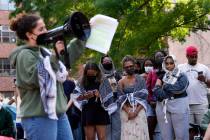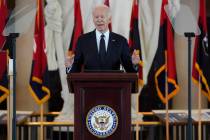Pay in public sector debated
CARSON CITY -- Police and firefighter union leaders on Wednesday ripped a Las Vegas Chamber of Commerce survey that found their members earn far more than those in similar jobs across the state and nation.
"They wonder who died and made the Chamber of Commerce our conscience," Las Vegas Police Protective Association Executive Director David Kallas said about his members.
"Listening to their numbers guy made me want to walk in front of a car, we are such a burden," added Rusty McAllister, president of the Professional Firefighters of Nevada.
Kallas and McAllister spoke to the Senate Government Affairs Committee after a presentation by Las Vegas Chamber of Commerce Chairman Steve Hill and two chamber consultants, Jeremy Aguero and Guy Hobbs.
Aguero said his survey, released last summer, showed that public employees in Nevada earn 28 percent more than people in similar jobs for private companies in Nevada.
He added that state employees on the average earn 2.4 percent more than typical state employees around the country.
Local government employees in Nevada earn 15.6 percent more than others working in cities and counties across the nation.
Teachers, on the other hand, earn 93.5 percent of the average pay of teachers in the nation, according to Aguero.
Nevada, however, also has the lowest number of public employees on a per capita basis of any state in the nation, he added.
The hearing comes at a time when Gov. Jim Gibbons is proposing 6 percent cuts in the pay of state employees, teachers, and university and community college employees because of declining tax revenues and a budget shortfall.
Gibbons wants to divert $66 million in property taxes from Clark County and $13 million from Washoe County.
No action on any bill was taken during the four-hour hearing.
During previous hearings, the governor's aides have testified that the administration believes salaries paid by local governments are too high and should be brought in line with what the state pays.
But Clark County government officials said last week they are bound by the contracts they previously negotiated with unions and must continue to pay employees salary and cost of living increases. City of Reno employees, however, recently changed their contract and took a 2.5 percent pay cut as a way to avoid layoffs.
Hill said his organization opposes the pay cuts sought by Gibbons on state employees and teachers, but wants "over time" to have local government salaries brought into parity with state employee pay.
He also called on legislators to start doing something about the $6.3 billion unfunded liability facing the Public Employees Retirement System and the $4 billion liability facing the Public Employees Benefits program.
According to a study released during the hearing, the unfunded debt facing PERS had grown to $7.2 billion as of last June 30. That liability, however, was calculated before the fall and winter decline in the stock market.
"Our goal is to get the state on a sustainable and responsible fiscal path," Hill said.
Although the committee made no decisions following the hearing, Senate Minority Leader Bill Raggio, R-Reno, said there "has to be some kind of revision " to current retirement and compensation systems.
"We have to make it have the least impact on current employees as possible," he added.
During his presentation, Aguero calculated what custodians working for a private company and a local government would earn in their lifetimes.
If each started at $35,000 a year in 2008 at age 24 and received the typical pay increases and retirement benefits paid respectively by private companies and local governments, then the custodian for the local government would receive $600,000 more in lifetime pay and benefits by the time both died at age 78.
What riled McAllister was Aguero's finding that firefighters in Nevada local government earn 55 percent more than the typical firefighter around the country.
The chamber's study showed that Nevada firefighters in 2006 were paid about $95,000 on average, when the national average was about $61,000.
Instead of hiring more employees, McAllister said, existing employees work overtime, which he described as cheaper than hiring, training and paying medical benefits for new firefighters.
The Clark County Fire Department would have to hire 238 more employees to reach the national average of 1.2 firefighters per 1,000 residents, he said.
And he noted that anyone in the audience would be willing to pay anything to a firefighter who pulled a drowning child out of their pool.
He added that U.S. Department of Labor statistics show that Clark County firefighters earn 47 cents more per hour than the national average.
Kallas also attributed to overtime the survey's finding that local police earn more than the national average.
Nevada police officers earned on average about $75,000 in 2006, 27 percent more than the U.S. average of about $59,000, according to the chamber study,
Kallas said that $5 million of the overtime paid last year by the Las Vegas police came from private companies. Private firms contract police to work at special events, and they cover the cost of the officer's salary.
Kallas contended the chamber's real motive was to break up the union negotiation processes that public employees have with local governments.
Rather than cutting pay of public employees, Kallas said it was time for the private sector "to raise the bar" on the pay it gives its employees.
Contact Capital Bureau Chief Ed Vogel at evogel@reviewjournal.com or 775-687-3901.
Fiscal analysis report
POLITICAL EYE
Full coverage on politics
At A Glance
• The Las Vegas Chamber of Commerce found state and local government employees earned median pay of $47,449 in 2006, compared with $37,039 for private company workers in Nevada.
• In 81.5 percent of the cases where the public and private sectors had the same type of workers, public workers earned more, 28.7 percent more on average.























